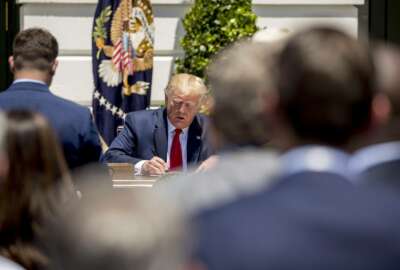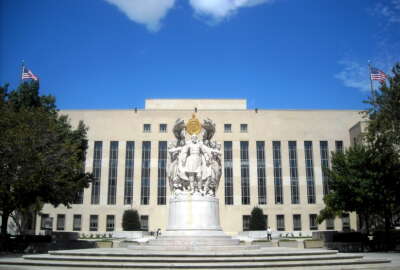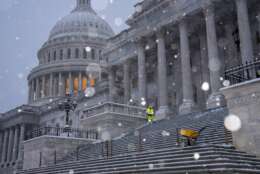
Unions ask full appeals court to take up case on Trump’s workforce executive orders
The legal battle over the president's workforce executive orders continues, after federal employee unions on Friday asked the full U.S. Court of Appeals for the...
In an ongoing legal battle, federal employee unions Friday requested a rehearing before the full U.S. Court of Appeals over the merits of President Donald Trump’s workforce executive orders.
A group of federal employee unions, which sued the Trump administration last June over the president’s workforce executive orders on collective bargaining, official time and employee removals, have requested a rehearing “en banc” before the full U.S. Court of Appeals for the District of Columbia Circuit.
A three-judge panel on the U.S. Court of Appeals in July had overturned an August 2018 decision from a federal district court. The panel ruled the lower court didn’t have jurisdiction to invalidate portions of the president’s executive orders, effectively allowing the Trump administration to begin enforcing them.
But in doing so, the appeals court did, however, delay implementation of the EOs — setting the stage for federal employee unions to appeal.
The unions’ latest request isn’t a surprise, as both the American Federation of Government Employees and the National Treasury Employees Union have said in recent weeks they would ask for a rehearing.
Union plaintiffs had 45 days to ask for a rehearing. Friday’s request falls right near that deadline.
“The court should grant rehearing en banc because this case presents a question of exceptional importance: Whether the doctrine of administrative ‘channeling’ should, for the first time, be expanded to thwart judicial review of executive orders that, together, rewrite an act of Congress,” the unions wrote in their rehearing request.
First, the unions contend the president’s workforce executive orders have effectively rewritten portions of the Civil Service Reform Act and Federal Service Labor-Management Relations Statute of 1978. Those statutes, the unions said, were deliberately designed to end the practice of presidential administrations using executive orders to govern on matters related to collective bargaining.
The 1978 law codified collective bargaining as “in the public interest,” but Trump’s 2018 executive orders, the unions argued, are an “attempt to revive the very type of executive-controlled regime that Congress intended the statute to end,” the rehearing request reads.
In addition, the unions argued the July ruling from the appeals court contradicts judicial precedent. The unions cited a specific case, National Mining Association v. Department of Labor, which they said precludes them from having their complaints reviewed through “piecemeal administrative actions.”
Related Stories
U.S. attorneys had asked the appeals court last month to lift the injunction on the president’s EOs after the three-judge panel’s July decision.
Legal battles over the president’s three workforce executive orders have stretched on for more than a year.
After the EOs were initially released last May, a a group of more than a dozen federal employee unions filed suit in federal district court last summer.
The federal district in August invalidated nine key provisions from Trump’s workforce executive orders, meaning agencies, technically, couldn’t set strict limits on union representatives’ use of official time or ban the organizations from using government office space.
Federal employees unions, however, have said they’ve continued to experience direct impacts of the president’s EOs over the past year while legal battles have continued.
After an unfavorable decision from the federal district court, the Trump administration appealed last September.
The appeals court in July dismissed the lower court’s decision because, as the three judges argued, the lower court lacked jurisdiction in ruling on the case. But the appeals court didn’t weigh in on the legal merits of the president’s workforce executive orders, a point that has ultimately fueled the unions’ latest request for a rehearing.
The full U.S Court of Appeals for the D.C. Circuit must decide whether it will take up the unions’ case. If it does, legal battles over the president’s workforce executives will continue and their enforcement within agencies will stall. But if the court doesn’t take on the unions’ petition, the EOs may quickly become the lay of the land.
Throughout these legal battles, the government has maintained that federal employee unions should take their complaints with Trump’s workforce executive orders in specific collective bargaining instances to the Federal Labor Relations Authority.
More Workforce News
“The anti-worker executive orders issued by President Trump are in violation of the law and, if implemented, would send the federal workforce into disarray,” J. David Cox, AFGE national president, said Friday in a statement. “This case is vitally important with far-ranging implications for every American and deserves a hearing before the full court.”
If the executive orders are allowed to be implemented, agencies would impose unfair contracts and diminish federal employees’ bargaining rights, NTEU National President Tony Reardon said.
“This isn’t just about federal employees and their unions,” he said in a statement. “This case is about preserving our merit-based civil service system and making sure that taxpayers can count on federal agencies being staffed by highly-qualified employees who are treated fairly as they go about the business of delivering important government services to the public.”
In a series of briefs before the appeals court, the government argued a delay in lifting the injunction on the EOs would have a real and immediate impact on ongoing collective bargaining negotiations with several agencies, including the Office of Personnel Management and the departments of Housing and Urban Development, and Veterans Affairs, among others.
Unions, however, rejected that argument. They said holding the injunction in place would simply maintain the status quo for collective bargaining, which has been in place since the Civil Service Reform Act and Federal Service Labor-Management Relations Statute became law back in 1978.
Copyright © 2025 Federal News Network. All rights reserved. This website is not intended for users located within the European Economic Area.
Nicole Ogrysko is a reporter for Federal News Network focusing on the federal workforce and federal pay and benefits.
Follow @nogryskoWFED









